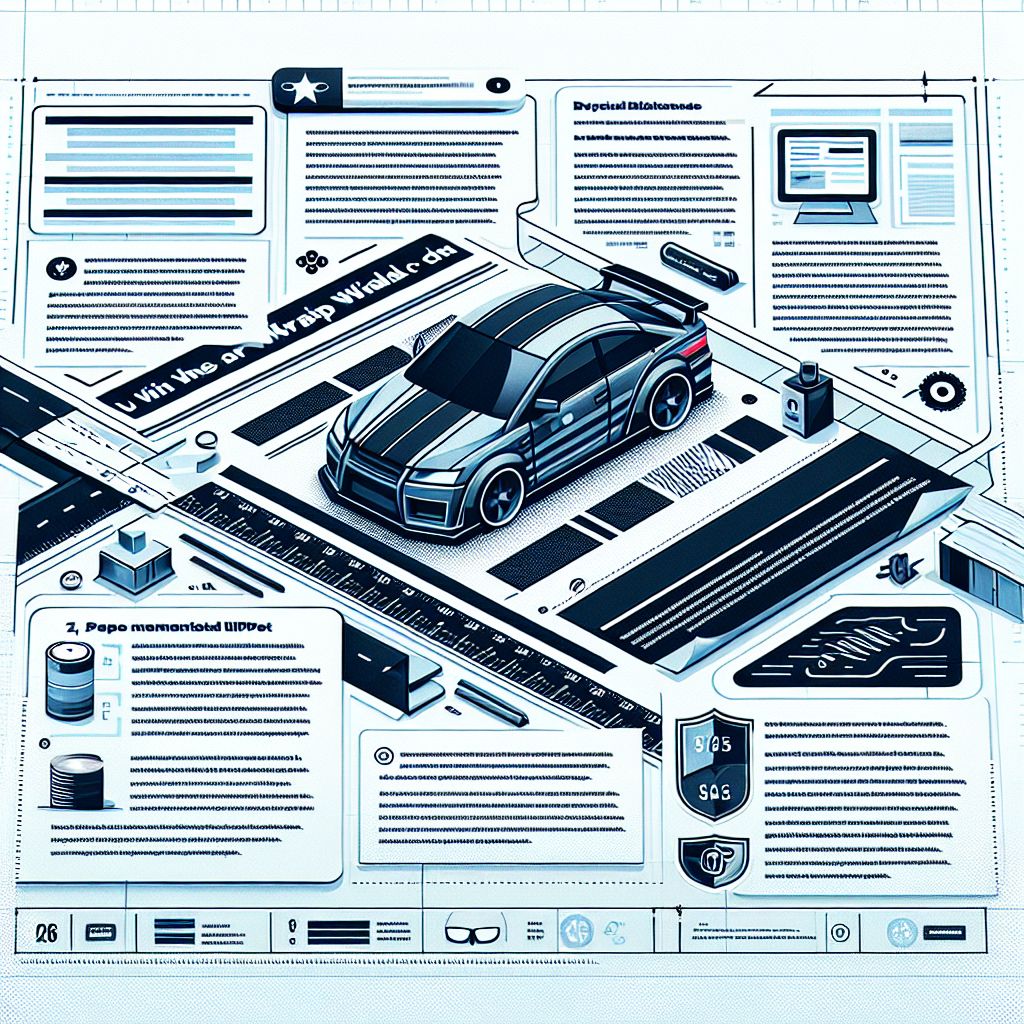
Key Takeaways: Car Wraps
- Car wraps are considered a cosmetic change and don’t usually require RMV notification in Massachusetts.
- It’s essential to check with your insurance provider to understand how a wrap may affect your coverage.
- Choosing a certified installer can help ensure that your car wrap complies with state laws and lasts longer.
- Car wraps can protect your vehicle’s paint and potentially increase its resale value.
- While wraps are legal, certain modifications like changing the structural integrity of the car may require RMV reporting.
The Basics of Car Wraps: What Are They?
When it comes to giving your car a new look in Massachusetts, wrapping it with a vinyl film is a popular choice. But, before you get swept away by the stunning array of colors and finishes, it’s crucial to understand the local RMV regulations and insurance guidelines that apply to car wraps. Let’s dive right in and ensure you’re equipped with all the knowledge you need.
So, what exactly is a car wrap? In simple terms, it’s like a big, high-quality sticker for your vehicle. Made from durable vinyl, these wraps are designed to cover the exterior of your car, truck, or van, giving it a brand-new appearance without the need for a paint job. They come in various colors and styles, which means you can get as creative as you like with the design.
Understanding Vinyl Car Wraps
A vinyl car wrap is a thin, adhesive film applied over the paint of your vehicle. The wrap can completely change the vehicle’s appearance while preserving the original paint underneath. They’re not permanent, which means you can remove or change them without damaging the car’s surface.
Benefits of Wrapping Your Vehicle
Why choose a car wrap? Here are a few compelling reasons:
- Protection: Wraps protect your car’s paint from scratches, sun damage, and minor abrasions.
- Resale Value: By shielding the original paint, wraps can help maintain or even increase your vehicle’s resale value.
- Customization: With a vast array of colors and finishes, you can personalize your ride to match your style.
- Cost: Generally, wrapping a car is more affordable than a full paint job.
Massachusetts Regulations for Car Wrapping
In Massachusetts, car wraps are seen primarily as a cosmetic modification, which means they don’t typically necessitate a trip to the RMV . However, staying informed about any changes in regulations is crucial, as state laws can evolve. For the most part, you won’t need to update your vehicle registration or title after getting a wrap, as long as the vehicle’s color isn’t drastically changed.
RMV Guidelines on Car Wraps
Massachusetts RMV doesn’t require you to report a car wrap. However, if you decide to alter the color of your vehicle significantly, you should update your registration details to reflect this change. This is because your car’s color is a critical identifier in the event of theft or an accident.
Example: If you wrap your black sedan in a bright pink vinyl, this would be considered a significant color change, and you should inform the RMV .
Do You Need to Notify the RMV ?
Most of the time, you don’t need to tell the RMV about your new wrap. But, if you change the color of your vehicle, it’s a different story. Here’s what you should do:
- Check if the color change is drastic enough to warrant a notification.
- If it is, update your vehicle registration details with the Massachusetts RMV .
- Keep a record of the change in case you need to provide proof in the future.
Remember, this is about ensuring your vehicle’s information is accurate and up-to-date. It’s a simple step that can save you from potential headaches down the road.
Navigating Insurance Policies with Car Wraps
Now, let’s talk about insurance. When you wrap your car, it’s not just about following RMV rules. You also need to think about how it affects your insurance policy. Some folks might worry that a wrap could increase their premiums, but that’s not always the case.
Here’s the deal: Insurance companies are mostly concerned with risks and costs. A wrap that protects your car’s paint might even be seen as a good thing. But, you need to let your insurer know about the wrap to make sure it’s covered in case of damage or theft.
Insurance Coverage for Vinyl Wraps
Insurance coverage for car wraps can vary from one policy to another. Generally, a car wrap is considered an aftermarket addition, similar to a new sound system or custom wheels. It’s important to review your policy or speak directly with your insurance agent to understand your coverage. Some key points to consider include:
- Is the vinyl wrap covered under your current policy?
- Will the wrap affect your premiums?
- In case of damage to the wrap, what kind of coverage can you expect?
Communicating with Your Insurance Provider
Before you get your car wrapped, reach out to your insurance provider. Explain what you’re planning and ask how it might impact your policy. You want to be clear on:
- Any changes to your monthly premiums.
- How to file a claim for wrap damage.
- If your wrap needs separate coverage as a custom part.
Keep this conversation on record. If you ever need to file a claim, you’ll have proof that you did your part to keep the insurance company informed.
Massachusetts RMV Car Wrap Regulations & Insurance Guidelines
| Aspect | Description | Reference |
|---|---|---|
| Car Wrap Regulations | Familiarize yourself with the car wrap regulations set by the Massachusetts Department of Motor Vehicles (DMV). These regulations outline requirements for design, placement, and materials used for car wraps to ensure compliance with state laws. | [1] |
| Insurance Guidelines | Understand the insurance guidelines related to car wraps provided by insurance companies in Massachusetts. These guidelines may include requirements for notifying the insurance provider about modifications to the vehicle’s appearance and any impact on coverage. | [2] |
References:
- Massachusetts RMV Car Wrap Regulations – Massachusetts Department of Transportation
- Insurance Guidelines for Car Wraps – Massachusetts Division of Insurance

Maintaining Compliance with State Laws
Staying on the right side of the law is crucial when you wrap your car. In Massachusetts, the legal requirements are pretty straightforward: no deceptive or reflective wraps, and if you change the vehicle’s color, update the RMV . Most importantly, don’t use wraps that mimic official vehicles, like police cars or ambulances.
Wraps are legal in Massachusetts as long as they don’t obstruct your view or have text or images that could be considered offensive or distracting to other drivers. And, of course, your wrap shouldn’t cover your license plates or VIN.
Now, if you’re thinking about other modifications that go beyond cosmetic changes, like altering the car’s structure or performance, that’s a different ball game. Those types of mods might need a closer look from the RMV , and they could affect your insurance too.
So, to keep things smooth with your car wrap:
- Stick to the state’s guidelines for vehicle appearance.
- Keep your RMV records up to date if you change the car’s color.
- Make sure your wrap doesn’t interfere with safety features or visibility.
Legal Implications of Car Wrapping
It’s rare, but you could face legal issues if your wrap isn’t up to code. Say your wrap is too reflective and causes glare for other drivers, or it has images that could be misinterpreted as an emergency vehicle. These situations could lead to fines or even having to remove the wrap. So, choose your design wisely and always consider safety and legality.
Steering Clear of Penalties
To avoid any penalties related to your car wrap:
- Always choose non-reflective materials.
- Avoid designs that resemble any official markings or symbols.
- Follow up with any required RMV updates if you alter your vehicle’s color.
Wrap Installation and Care
Getting a car wrap is exciting, but remember, not just anyone should slap that vinyl on your ride. You want a professional who knows what they’re doing. A certified installer will ensure the wrap looks great, lasts long, and doesn’t harm your car’s paint.
Caring for your wrap is also key to its longevity. Clean it regularly with the right products, and be gentle – no harsh brushes or chemicals. And when it comes to parking, try to find a shady spot or use a car cover to protect the wrap from sun damage.
Choosing a Certified Installer
Here’s how to find the right installer for your car wrap:
- Look for certifications from reputable organizations in the vinyl wrap industry.
- Check reviews and ask for photos of their previous work.
- Ensure they offer a warranty for the installation.
By taking these steps, you’ll help guarantee a wrap job that’s both stunning and compliant with state laws.
Long-term Care for Your Wrapped Vehicle
Once your car is wrapped, taking good care of it will help extend the wrap’s life and maintain its appearance. Think of it like caring for a new smartphone screen. You’d use a protective case and be cautious about where you put it down, right? The same goes for your car wrap.
For the best care:
- Wash your vehicle by hand with a gentle automotive detergent and soft cloth or sponge.
- Avoid high-pressure washes and waxing, as these can damage the wrap.
- Keep your car under a cover or parked in the shade to prevent UV damage.
By following these simple steps, your wrap can look fresh and vibrant for years to come.

FAQs
Are Car Wraps Legal in Massachusetts?
Yes, car wraps are legal in Massachusetts. They’re considered a form of vehicle customization that does not typically require any special permissions or changes to your vehicle’s registration. However, you should be aware of a few guidelines:
- The wrap should not be reflective or mimic emergency or official vehicles.
- If you change the color of your car significantly, you need to update your registration details with the RMV .
Following these rules will help you enjoy your wrap without any legal trouble.
How Do Car Wraps Affect Insurance Premiums?
Car wraps can affect insurance premiums in different ways, depending on your insurer. Some providers may view wraps as a form of protection for your vehicle, which could potentially lower premiums. Others might consider it a customization that needs additional coverage. The best approach is to:
- Contact your insurance provider before getting a wrap.
- Discuss how the wrap will be factored into your policy.
- Get any policy updates or changes in writing.
This way, you’ll avoid any surprises if you need to file a claim in the future.
Can Car Wraps Void a Vehicle’s Warranty?
Generally, a professionally installed car wrap should not void your vehicle’s warranty. However, there are exceptions. If the wrap causes damage to the paint or the vehicle’s surface due to poor installation or removal techniques, the manufacturer might not cover these damages under warranty. Always choose a reputable installer to prevent this issue.
What is the Lifespan of a Car Wrap?
The lifespan of a car wrap varies based on several factors:
A high-quality vinyl wrap typically lasts between 5 to 7 years if properly maintained. Factors such as exposure to the elements, the quality of the installation, and how the vehicle is cared for can all affect the wrap’s longevity.
Investing in a quality wrap and following proper care guidelines can help you get the most out of your vehicle’s new look.
Is It Necessary to Inform the RMV of a Wrap?
In Massachusetts, you don’t need to inform the Registry of Motor Vehicles (RMV) about a car wrap unless it involves a significant color change. If you’ve altered your vehicle’s color, here’s what to do:
- Update your vehicle registration with the new color information.
- Keep documentation of the wrap and any correspondence with the RMV.
Staying proactive with these details ensures you’re fully compliant with state regulations.
Understanding the Massachusetts RMV car wrap regulations is crucial for any vehicle owner or advertising agency looking to leverage this form of mobile marketing. Not only do you need to comply with specific guidelines for the wrap itself, but you must also understand the insurance implications to ensure your vehicle is fully covered. This includes knowing the types of coverage required and how a wrap can affect your insurance premiums.




